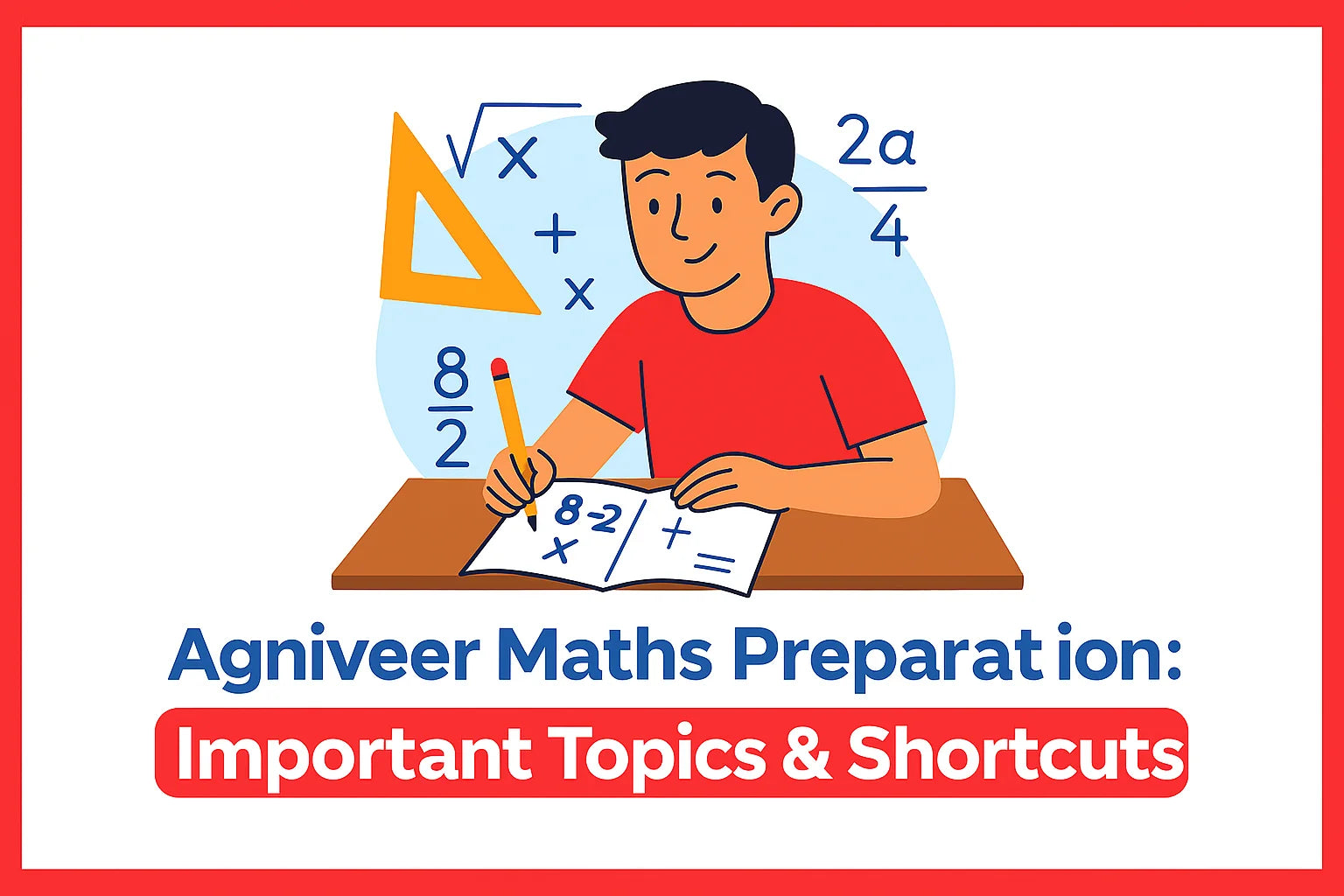Preparing for Agniveer 2025 is not just about reading books. It needs a clear plan, steady effort, and focus on all three stages—the written exam, physical test, and medical test.
The Agniveer written exam for the Army, Navy, and Air Force generally covers General Knowledge (GK), General Science, Mathematics, English, and Reasoning/Computer Knowledge (depending on the branch). The questions are multiple choice, and there is negative marking for wrong answers.
This guide will give you a subject-wise strategy, a daily study plan, and tips for physical and medical preparation.
Know the Exam Pattern and Syllabus
Before you start getting ready, you must know what you need to learn. Even though the pattern may change a bit for each branch, these areas are always there:
-
General Knowledge—History, geography, sports, current affairs, Indian defense forces, awards, and culture.
-
General Science—Basic Physics, Chemistry, and Biology concepts from school-level studies.
-
Mathematics – Arithmetic, algebra, geometry, trigonometry, and data handling.
-
English – Rules of words, word bank, getting the meaning, and how words are used.
-
Reasoning/Computer Knowledge—Brain teasers, clear thinking, patterns, secret languages, and easy computer ideas.
When you know what to learn, it can help keep you from wasting time on things you don’t need.
Read More: How Many Hours is the Agniveer exam?
Make a Simple Study Plan
Your plan should give time to all subjects and also include physical training. A sample routine could be:
|
Time of Day |
Activity |
|
Morning |
Study theory (focus on one subject each day) |
|
Afternoon |
Practice questions and solve mock tests |
|
Evening |
Physical fitness training (running, push-ups, etc.) |
|
Night |
Quick revision and rest |
You do not need 10–12 hours of study. Even 4–6 hours of focused study daily, along with physical training, can give good results if done consistently.
Let’s look at the subject-wise preparation strategy
1. English
-
Get a grip on main grammar rules such as tenses, articles, and prepositions.
-
Read easy English news each day to get better at words and understanding.
-
Work on fill-in-the-blanks, synonyms, antonyms, and sentence fixing.
-
Go through reading passages to boost speed and grasp of reading.
-
Note new words and look at them each day.
2. Mathematics
-
Start with the simple: counting modes, pieces of a whole, ratios & shares, and average.
-
Then progress to algebra, geometry, trigonometry, and basic statistics.
-
Learn the big formula and work it with the problems.
-
Attempt papers of previous years to understand the type of sums asked.
-
Work on speed—time yourself with some problems.
3. General Science
-
Review Physics areas: including motion, force, energy, and waves.
-
For chemistry, concentrate on elements, compounds, and routine reactions.
-
For Biology, learn about study the human body, plant life and the environment.
-
Adopts short notes for last minute revision before the examination.
-
Attempt objective questions based on it and analyze your performance.
4. General Knowledge (GK)
-
Learn more about the history of India, its geography, facts about Indian history, and much more.
-
Stay informed, particularly about defense-related news.
-
Create a tiny notebook of informative facts.
-
It helps revise them on a weekly basis so you don’t forget older topics.
-
Test yourself with online quizzes.
5. Reasoning / Computer Knowledge
-
Practice reasoning questions like series, analogies, and coding-decoding.
-
For non-verbal reasoning, focus on pattern matching and puzzle-solving.
-
If your syllabus includes computers, revise basic terms like "hardware," "software," and "networking."
-
Spend at least 15–20 minutes daily on reasoning practice.
Choosing the Right Study Material
Time is saved when the right resources are utilized. Go for Agniveer books aligned to the latest syllabus that contain both concepts as well as practice questions.
If you are targeting the Navy exam, get Indian Navy Agniveer books, covering branch-wise issues.
For Air Force Aspirants—Select Air force Agniveer books with the right subject coverage and sample papers.
These focused books allow you to concentrate on what really matters for your branch of service.
Practice, Revision, and Mock Tests
-
Mock Tests: Attempt full-length mock exams regularly to build speed and accuracy.
-
Previous Papers: Solving old papers helps you understand question patterns.
-
Revision Notes: Maintain short notes of important formulas, facts, and rules for quick review.
-
Weak Areas: Identify topics you find difficult and give them extra time.
-
Avoid Guessing: Because of negative marking, only attempt questions you are sure about.
Physical Fitness Preparation
The physical test is a major part of selection. Start training early:
-
Running: Begin with short distances and slowly increase speed and stamina.
-
Strength Training: Include push-ups, sit-ups, squats, and other exercises.
-
Flexibility: Do stretching exercises to avoid injury.
-
Diet and Rest: Eat balanced meals and sleep well for recovery.
Medical Test Preparation
The medical test checks your overall health:
-
Maintain a healthy body weight for your height.
-
Take care of your eyesight and dental hygiene.
-
Avoid habits like smoking or chewing tobacco.
-
Stay hydrated and keep your body fit.
Final Month Strategy
-
Spend more time on revision than on learning new topics.
-
Take at least 2–3 mock tests each week.
-
Review your mistakes immediately after each test.
-
Rest well before the exam to keep your mind fresh.
Final Thoughts
You’ll have to work a lot because to clear Agniveer 2025, you need all-round preparations—good command of topics, daily revision, body workouts, and you must stay in good health.
Use this approach for all subjects, and a simple study guide will ensure you are on track and doing better step by step.
Stay disciplined, get frequent feedback, and stay focused on that goal. Success is sure with persistent efforts to step into the Indian Armed Forces.

 >
>
 >
>
 >
>
 >
>
 >
>




